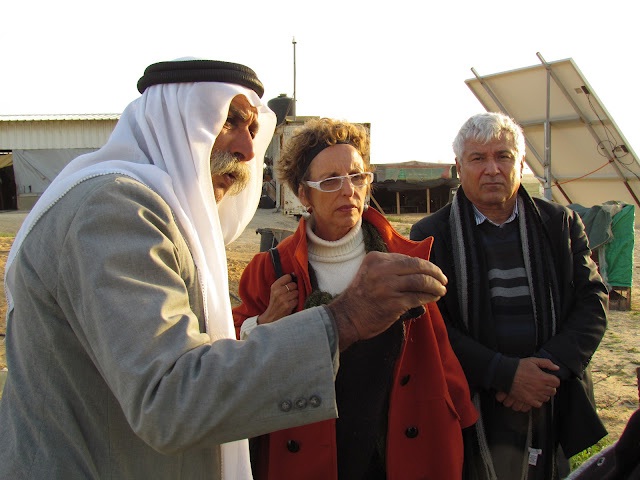UN Expert on Adequate Housing: Land Development model in Israel and OPT Excludes, Discriminates, and Displaces Palestinians

SR Ms. Raquel Rolnik (center) with Dr. Thabet Abu Rass (right)
and Sheikh Sayyah Al-Touri of Al-Araqib
(Haifa and Beer el-Sabe) On 12 February 2012, the UN Special Rapporteur (SR) on Adequate Housing, Ms. Raquel Rolnik, completed her two week official visit to Israel and the Occupied Palestinian Territory (OPT). Adalah provided briefings to the UN SR on our key concerns regarding the right to adequate housing for Palestinian Arab citizens of Israel, and accompanied a tour in the Naqab (Negev). Ms. Rolnik issued her strong preliminary statements at a press conference in Jerusalem on 12 February.
In her preliminary conclusions, the SR noted: Throughout my visit, I was able to witness a land development model that excludes, discriminates against and displaces minorities in Israel, which is being replicated in the occupied territory, affecting Palestinian communities. The Bedouins in the Negev – inside Israel – as well as the new Jewish settlements in area C of the West Bank and inside Palestinian neighbourhoods in East Jerusalem - are the new frontiers of dispossession of the traditional inhabitants, and the implementation of a strategy of Judaisation and control of the territory…
In different legal and geographical contexts, from the Galilee and the Negev to the West Bank, I received repeated complaints regarding lack of housing, threats of demolition and eviction, overcrowding, lack of community development, the disproportional number of demolitions affecting Palestinian communities and the accelerated development of predominantly Jewish settlements.
On 6 February 2012, Adalah Attorney Suhad Bishara led a comprehensive briefing on the legal framework regulating land, housing and planning rights in Israel. Focusing on the mechanisms used to deny equal access to adequate housing to Palestinian citizens of Israel, Attorney Bishara highlighted Adalah's relevant casework, such as the state's attempt to destroy and evict Arab Bedouin residents from the unrecognized villages of Atir and Umm el-Hieran. She also explained new discriminatory laws such as the Admissions Committee Law – 2011, and the Amendment (2010) to the Settlements that aim to ensure maximum control over land and housing to Jewish citizens, while restricting access to land for Palestinian Arab citizens and concentrating them onto a minimal amount of space. Adalah was joined at the briefing by partner organizations the Association for Civil Rights in Israel (ACRI) and Mossawa.
On 8 February 2012, Adalah's Naqab office arranged a tour for the SR and her staff to various unrecognized villages, and organized an Expert Roundtable to discuss the particular challenges to adequate housing for the indigenous Arab Bedouin citizens of Israel. Following a tour to Assir and Abu-Tlul, villages designated to be destroyed and its population displaced according to the Prawer Plan, the SR met with villagers in Al-Araqib. Al-Araqib was destroyed today, 13 February 2012 for the 35th time since July 2010. Dr. Thabet Abu Rass, Director of Adalah's Naqab Office was joined by Professor Oren Yiftachel, Attorney Rawia Abu Rabia (ACRI), Haia Noach (Dukium), Farid Alatawne (the Regional Council for the Unrecognized Villages), and Khalil Alamour (Alsira village, Adalah Board member) for an in-depth roundtable discussion that addressed the history and policies of displacement, including "unrecognition" and the denial of basic services, forestation and the development of Jewish-towns; traditional land ownership and legal strategies; the frequent home demolitions; and the devastating implications of the now-pending Prawer Plan bill.











